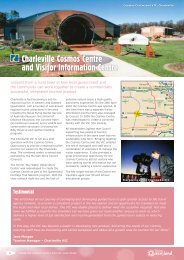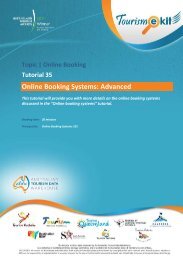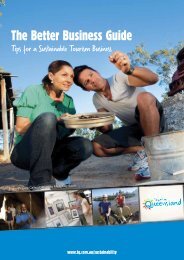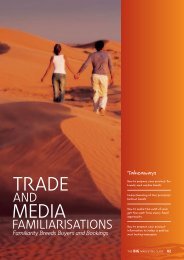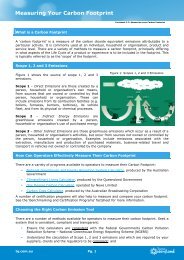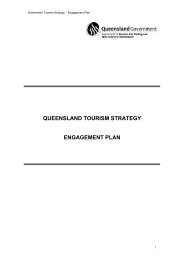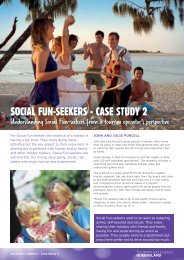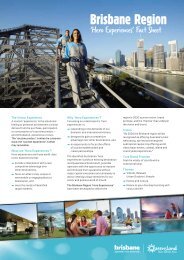Queensland Ecotourism Plan 2003-2008 - Tourism Queensland
Queensland Ecotourism Plan 2003-2008 - Tourism Queensland
Queensland Ecotourism Plan 2003-2008 - Tourism Queensland
Create successful ePaper yourself
Turn your PDF publications into a flip-book with our unique Google optimized e-Paper software.
can be achieved – direct contributions to conservation by ecotourism businesses may involve<br />
participating or supporting research and monitoring, assisting with natural resource<br />
management activities, the conduct of interpretive programs which educate visitors about<br />
natural area management and general environmental issues, and returning a percentage of<br />
revenue to the management of natural areas visited. Independent visitors can contribute to<br />
conservation of natural areas visited by adhering to visitor codes of practice / minimal impact<br />
techniques, participating in management surveys, reporting inappropriate behaviour to<br />
managers and rangers, picking up litter on route and participating in organised community<br />
service activities (such as clean ups, weeding, scientific research) in natural areas.<br />
Ecologically sustainable practices are critical at a site level, however, ‘ecological sustainability’<br />
encompasses broader practices such as minimising the use of non-renewable resources like<br />
water and energy and using renewable energy wherever possible, in offices and<br />
accommodation. Minimising usage of chemicals (such as cleaning products) and minimising<br />
solid waste (from excess packaging, office wastes, etc) are also key aspects of ecological<br />
sustainability.<br />
Social sustainability<br />
Social and cultural sustainability are fundamental aspects of ESD. The benefits of ecotourism<br />
should outweigh any cost to the host community and the local environment. Achieving social<br />
and cultural sustainability will require that tourism operators involve the local community in the<br />
development and management of their tourism ventures, in ways that ensure the local<br />
community derives genuine benefits from tourism occurring in their local area. Benefits from<br />
tourism to local communities should include employment, stimulating demand for locally<br />
produced and owned goods and services, provision of additional infrastructure that benefits<br />
local communities as well as visitors, investment in conservation and management of the local<br />
environment and a sense of pride in the local community.<br />
31<br />
Presentation of local communities through interpretive programs and activities that encourage<br />
interaction between visitors and local residents should aim to develop a greater understanding<br />
and appreciation of the local lifestyle and culture, ensuring respect for the local community in<br />
destinations visited. Respect for local cultural heritage, particularly indigenous culture, is a key<br />
aspect in ensuring the social sustainability of ecotourism.<br />
Economic sustainability<br />
Underpinning an operation’s ability to commit to ESD is the need for the business to be<br />
economically sustainable. A profitable business will have greater capacity to contribute to<br />
conservation and invest in sustainable technology as well as provide stable employment<br />
opportunities for the local community and purchase more locally produced and owned goods<br />
and services.<br />
An economically sustainable ecotourism industry in <strong>Queensland</strong> requires effort by both the<br />
private and public sectors. The private sector will contribute to an economically sustainable<br />
ecotourism industry by following best practice business management principles, engaging<br />
expertise in business management practices when appropriate and meeting legal<br />
responsibilities and obligations. The public sector also has a key role to play in fostering an<br />
economically sustainable ecotourism industry, through recognising the commercial realities and<br />
pressures of operating a tourism enterprise and ensuring a business-friendly regulatory<br />
environment.



